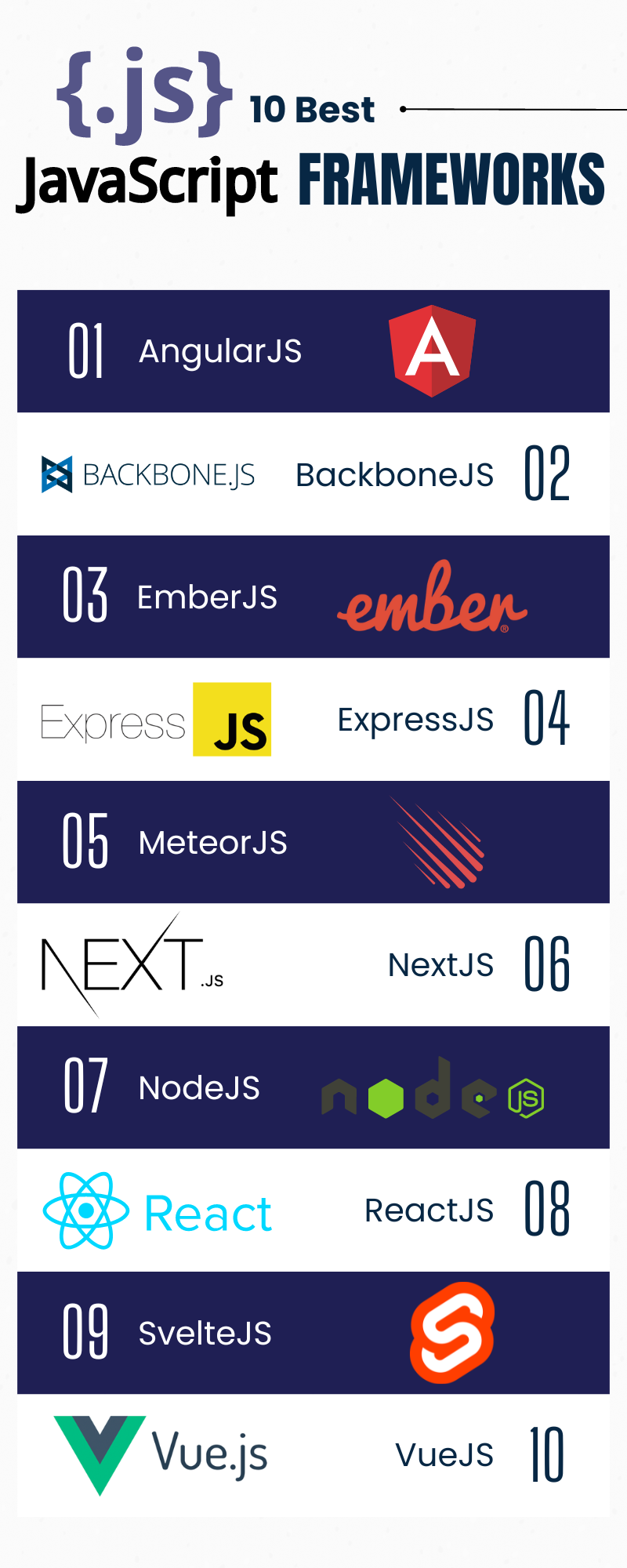10 Best Javascript Frameworks in 2023. Javascript is among the core programming languages since it helps create dynamic, scalable, and interactive applications. It is the world's third most popular language and facilitates some of the best javascript frameworks to help developers build top-notch applications for business. These frameworks are a library of pre-written javascript code for different purposes.
10 Best Javascript Frameworks To Consider in 2023
Here is the list of Top 10 Best Javascript Frameworks for 2023. What are the best Javascript Frameworks? The best javascript frameworks to consider are -
-
AngularJS
-
Backbone.js
-
EmberJS
-
Express
-
Meteor
-
Next
-
NodeJS
-
ReactJS
-
Svelte
-
VueJS
In addition, these frameworks also help save time and ease the software development process, thus making it effective and efficient.
Angular
It is one of the most used frameworks of Javascript maintained by Google. It helps develop single-page applications, is open-source, and makes the development process efficient. Its primary characteristics include two-way data binding, dependency injections, and easy DOM manipulation.
Read: JavaScript Developer Roadmap 2023
-
Pros of Angular -
-
It uses the MVC (Model-View-Controller) pattern to separate logic from the view.
-
It makes the creation of custom modules and libraries easy.
-
It also has a vast and powerful ecosystem and facilitates quick templates to speed up software development.
-
-
Cons of Angular -
-
It has a steep learning curve.
-
Its complex structure might enable performance issues.
-
Backbone.js
It is another JS framework that helps in developing single-page applications. It is a cross-platform, lightweight web app framework based on the MVC paradigm and is made available for use under the standard MIT license. Stripe, Tumblr, and Airbnb are known industry giants that use this framework in their respective applications.
-
Pros of Backbone -
-
It is lightweight, versatile, flexible, and easy to use alongside rich documentation.
-
It serves over 100+ extensions and enables a maintainable codebase.
-
Has Model-View-Presenter (MVP) architecture for web applications.
-
-
Cons of Backbone -
-
Writing unit test codes can be challenging.
-
It does not have any built-in support for data binding.
-
EmberJS
It is an open-source, cross-platform, component-based, javascript web framework used to create SPA (Single Page Applications). Developed by Ember Core Team, it is available under the MIT license. LinkedIn is a known company that uses EmberJS in its web application.
-
Pros of Ember -
-
It provides a complete toolset containing a router, data management library, and view layer, making the web development process productive.
-
It makes understanding a codebase easier since every Ember app has the same structure.
-
In addition, it also comes with an inspecting tool for easy debugging and has extensive documentation.
-
-
Cons of Ember -
-
It is less popular and has a high learning curve.
-
It renders slowly, and the developers might encounter issues during testing.
-
Express
It is an open-source back-end web app framework available under the MIT license and helps develop web apps and APIs. Its primary features include easy routing, rapid development, high performance, soft dependencies, and many others.
-
Pros of Express -
-
Cons of Express -
-
It has an unbalanced API, and the developer might encounter security issues.
-
Issues with the callbacks.
-

Meteor
It is an open-source, cross-platform isomorphic JavaScript web framework available under an MIT license. It uses an asynchronous programming model and supports different programming paradigms like event-driven, object-oriented, and others. In addition, MeteorJS also provides a command-line tool that helps in quickly developing and deploying web apps.
-
Pros of Meteor -
-
It facilitates built-in libraries to ease networking, UI rendering, and other tasks.
-
It has many packages for developers to install and use.
-
It is a full-stack framework and is easy to use.
-
-
Cons of Meteor -
-
It is not flexible and does not have rich documentation.
-
Its pre-built packages might cause issues with each other.
-
Next
It is an open-source web app framework developed by Vercel and the open-source community under the MIT license. It helps create user interfaces, static websites, and universal applications and supports progressive web apps. It has an integrated TypeScript experience and is highly influenced by React Router, Node ecosystem, community libraries, and others.
-
Pros of NextJS -
-
It is SEO-friendly and has strong community support.
-
It speeds up the development process and supports responsive design.
-
-
Cons of NextJS -
-
It is built for React and lacks high-end plugins.
-
It does not have any router flexibility.
-
NodeJS
It comes under the list of top javascript frameworks and is an open-source, cross-platform, back-end javascript runtime environment with an event-driven architecture. It was developed by OpenJS Foundation, is written in C, C++, and JavaScript, and is available under the MIT license. In addition, it helps in developing fast, efficient, robust, and scalable applications.
-
Pros of NodeJS -
-
It facilitates Node Package Manager (NPM), which helps manage the dependencies easily.
-
It uses the V8 JavaScript Runtime engine, which accelerates software performance alongside faster code execution.
-
It has a strong community and is easy to learn.
-
-
Cons of NodeJS -
-
It makes completing tasks complex since developers must depend on third-party libraries.
-
Sometimes, it gets challenging to manage the code since it has asynchronous programming.
-
ReactJS
It is among the best javascript frameworks to consider. It is an open-source javascript library developed and maintained by Meta and a community of individual developers. It helps develop user interfaces based on components and can be used as a base for developing single-page applications. PayPal, Quora, and Netflix are well-known industry giants that use react in their respective applications.
-
Pros of ReactJS -
-
It facilitates reusable components.
-
It is SEO-friendly and enables high performance with virtual DOM.
-
-
Cons of ReactJS -
-
It has a steep learning curve.
-
It does not cover server-side logic; it only works for the user interface.
-
Svelte
Also known as the disappearing framework, it is an open-source web framework created by Rich Harris and written in Typescript. In addition, it also provides a unique approach to developing progressive web apps and does not require processing the content inside an HTML/DOM document.
-
Pros of Svelte -
-
It is simple and easy to use.
-
It provides a positive and enhanced user experience along with faster execution.
-
-
Cons of Svelte -
-
It does not have any IDE support.
-
It becomes more challenging to scale apps that are developed using Svelte.
-
VueJS
It is one of the top javascript frameworks, written in Typescript, available under the MIT license, and is maintained by a team of core developers. It is an open-source javascript framework that helps develop UIs and Single Page Applications. In addition, it has an adaptable architecture and uses the one-way data flow model. Upwork is one such industry giant that uses Vue in its application.
-
Pros of Vue -
-
It is easy to learn and adapt to, especially for beginners.
-
It has strong community support and enables high front-end security.
-
-
Cons of Vue -
-
It has a small plugin library system.
-
It has a language barrier since its major communities are in China, making the documentation hard to read.
-
Wrapping It Up
There are numerous Javascript frameworks that did not make it to the list. However, those mentioned above are some of the best javascript frameworks that enable developers to build top quality, superior performing, high-level, user-friendly, scalable, and versatile applications for your business.
FAQs
Which JavaScript framework should I learn in 2023?
-
Angular, React, Node.js, Vue, and Express are some of the best Javascript frameworks you should know in 2023.
Which JavaScript framework is best for the future?
-
Every framework has specific capabilities that cater to different requirements, but you can consider learning ReactJS, Angular, and NodeJS for a fruitful future.
Why consider using Javascript for software development?
-
Javascript is a widely used programming language and caters to innumerable benefits to the developers while developing an application, the client, and the business. Some of the advantages of using JS are -
-
It supports all modern browsers
-
It works great with other programming languages
-
Enables the development of rich interfaces
-
It is simple, popular, versatile, and
-
It also helps in developing high-performing applications.
-


